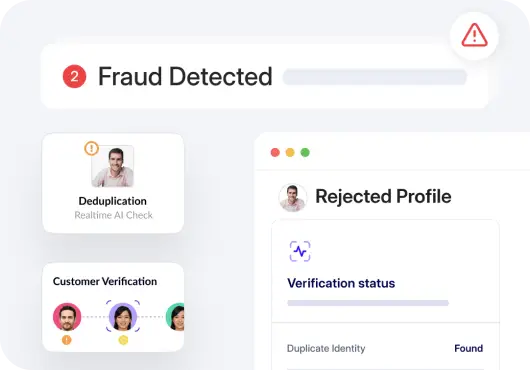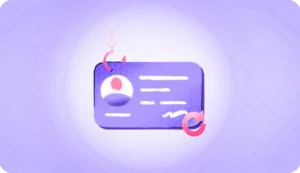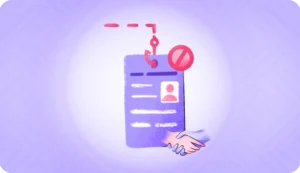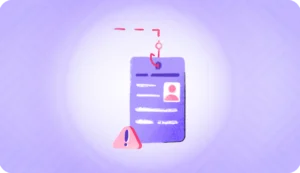Identity theft occurs when someone steals your personal information, such as your name, Social Security number (SSN), or credit card details, and uses it for financial gain.
This can lead to unauthorized charges, medical bills, loans taken out in your name, fraudulent charges on tax returns, and other harmful activities that can severely impact your financial health and personal well-being.
Identity theft has become a serious concern worldwide, with 1.4 million cases reported to the Federal Trade Commission (FTC) in 2024. Whether you’ve already been a victim of an identity thief or want to be prepared, understanding the steps to recover from and protect your identity is necessary.
The impact of identity theft
You may face several consequences due to identity theft, such as:
- Financial loss: With the help of e-transactions using your data, computerized robberies can launder all your money away overnight and leave certain accounts overdrawn.
- Damaged credit score: Illegal conduct is seriously harmful to your credit rating. Every occurrence of fraud signifies a gap in your credit standing.
- Difficulty obtaining loans and credit cards: Lenders may view you as a high-risk borrower if your credit report shows numerous suspicious activities or defaults on fraudulent accounts.
- Emotional distress: The experience of identity theft can cause significant stress and anxiety. The ongoing effort required to resolve the issues and the uncertainty about your financial future can take a toll on your mental health.
How to recover from identity theft: Steps to follow

If you’re a victim of identity theft or you suspect your identity has been compromised, there are things you should do immediately to minimize the damage. This is how to recover from identity theft:
Identifying the theft
Double-check all of your open accounts for other unauthorized charges and transactions and look for any suspicious activity. Check your statements carefully for open accounts, such as bank accounts and credit card statements, and then immediately report any unauthorized account activities to your association.
Most credit card companies offer fraud protection, which means that identity theft can often be resolved quickly. If you see any unauthorized charges or withdrawals you didn’t make into your accounts, find out about them and keep a watch over your free credit report statements.
Check your credit report: Examine your three top credit bureau reports—Equifax, Experian, and TransUnion—for signs of fraud, such as:
- New accounts you didn’t open
- Unauthorized credit inquiries
- Unfamiliar employer information
- Any personal information that’s not yours
Get free credit reports: Get a free copy of your credit reports once each year from Equifax, Experian, or TransUnion. Keep a detailed list of all the transactions on your reports for at least the past 30 days. This will come in handy when contacting your creditors.
Frequently monitor your credit bureau and report for any new accounts or activities that you did not authorize. You can monitor credit card transactions for suspicious activity with HyperVerge’s Real-time AML Screening and Credit Monitoring service.
Taking action
Fraud can negatively impact your credit score, so you need to know what damage has been done immediately.
Reporting the identity theft to the FTC and law enforcement
To remove illegitimate accounts from your credit card issuer and your credit report back promptly, report the identity theft to the FTC.
Their website offers a guide on credit reporting and a recovery plan, along with instructions on how to file an Identity Theft Report. The Identity Theft Report serves as proof that your digital identity has been stolen. To use these resources, you should create an account with the FTC, which will allow you to save and print your Identity Theft Report and personal recovery plan for future reference.
After you’ve reported the identity theft, file a police report with your local police department. This measure can help protect you from further harm. Provide the police with as much information as possible, and bring your Identity Theft Report along. Keep a copy of your full police report and Identity Theft Report in a safe place for future reference.
Report to the SSA office
If you suspect someone is using your SSN fraudulently, report it to your local Social Security Administration (SSA) office.
Additionally, create a My Social Security account to monitor how your SSN is being used. This can help you get fraud alerts and track any unauthorized purchases or activities associated with your SSN.
Depending on the type of identity theft insurance, of the account or credit information that was compromised, there are specific organizations or three credit reporting agencies you can report identity theft to:
- Phone accounts: Report to the National Consumer Telecom and Utilities Exchange and request your data report.
- Social security benefits: Report to the Social Security Administration.
- Federal student loans: Report to the U.S. Department of Education.
- Tax fraud: Report to the Internal Revenue Service.
- Utility accounts (e.g., water, electricity): Report to your state’s Public Utility Commission.
By contacting the appropriate agencies, you can address the specific issues related to your identity theft case more effectively.
Contacting financial institutions
Now that you understand the extent of identity theft and have taken steps to recover from identity theft and prevent further damage, it’s time to contact the institutions and businesses involved. Start by reaching out to:
- Banks or credit unions. Inform them not to open accounts in your name. Request that they cease fraudulent operations and close these illegal entities immediately.
- The institution holding your legitimate accounts. Ask them if they can put a hold on your compromised account while you investigate things further. Any new fraudulent transactions are impossible after this shuffle of cards.
- Your credit and debit card companies. Request the issue of new cards, and your accounts must be frozen immediately to avoid the expenditure of any unauthorized transactions.
Scammers often rack up large debts in your name, such as on credit cards, leaving you with a huge financial burden. If debt collectors contact you for credit card charges that aren’t yours, you should:
- Inform collection agencies that you are a victim of identity theft. Every effort should be made to provide a copy of your police or FTC identity theft report in order to back up the claim.
- Contact the business that created the fraudulent account and request that they close these accounts in your name. If you are unsuccessful, reach out to your local consumer affairs office, which is a government agency that can assist with these matters.
- You can also put an extended fraud alert on your credit report. An extended fraud alert is good for seven years. This will prevent a thief from opening new credit cards and loans in your name.
Freezing your credit report
Add an extra layer of protection against fraudsters attempting to steal your personal information for identity theft by freezing your credit report. Once a credit freeze is in place, they will no longer have access to your credit information or be able to open fake accounts in your name.
In addition, all applications from someone using your name will eventually be turned down. It’s an extra layer of security as well as a bit of a nuisance. To apply for the three main credit bureaus, you will have to provide a peacetime relief code. Still, several credit bureaus now convince customers that it is possible to schedule when to re-freeze—for example, after a while has passed, making things easier overall.
Applying for a credit freeze is free, but you will need to contact individually the three major credit bureaus—Equifax, Experian, and TransUnion—to set it up. Unlike fraud alerts, where you only need to contact one of the three credit bureaus to spread the message, this process is different.
HyperVerge can help you understand the benefits of a credit freeze, which can add an extra layer of security to your financial information.
Restoring your identity
As soon as important documents such as your social security card, driver’s license, passport, or credit card(s) go missing, look for their immediate replacement. Try to act quickly by contacting the relevant agencies.
For example, you can contact the DMV to report your stolen driver’s license for insurance fraud and get a replacement issued as soon as possible. Similarly, your credit card provider may be able to cancel the card using its security code and then issue you another one.
The thief might have accessed your sensitive information by guessing your password. It’s important to review all your online accounts and ensure each password is unique and difficult to guess.
Avoid using easily identifiable information like your name or birthdate in your passwords. Consider using a Strong Password Generator tool to create strong passwords and better protect your information.
Preventing future identity theft
Contact the right people and take the steps you need yourself to stop being a victim of credit card fraud or identity theft. Banks and credit card companies typically have 24/7 support, so you have the ability to stop fraud as and when it happens.
- All your devices, including laptops, telephones, and even smartwatches, should be password protected. This way, no one else will be able to use them if they are lost or stolen.
- Strong, unique passwords and multi-factor authentication can further improve your security. Intensifying security in the manner indicated above is always good, as this helps guard against identity theft and protect your personal information from falling into criminal hands.
- A con artist might pose as an IRS representative or your credit card company. They do this in order to scare the information out of you, as they call it. If you get a call like that, ask for their identification, hang up, and then call your provider to confirm if it was truly them who called later.
- If you receive emails or text messages from someone you are not familiar with, do not open any options in the email. This could be a fraud message attempting to steal sensitive data from you.
- Burn documents containing personal information, bank statements, or medical records, for example. You should check your credit report often for any changes to it or signs of fraudulent activity.
By regularly monitoring, you can discover and block fraudulent charges or other fraud rapidly. HyperVerge offers identity verification and fraud alert solutions to assist with this process. You can also explore different identity verification methods for increased efficiency.
Takeaways
Recovering from identity theft can be a challenging and stressful process, but by following these key steps, you can minimize the damage and regain control over your financial life:
- Identify the theft: Look through your accounts from time to time to see if anyone is stealing from them.
- Report it: Alert the FTC, the local police, and your bank.
- Protect your credit: Freeze the credit reports so that no more fake accounts can be opened in your name.
- Restore identity: Get new documents if any of yours have been stolen. Use good, strong passwords.
- Prevent further incidents: Take preventative action, like setting up two-factor authentication and avoiding spam scams.
Regularly monitoring your financial accounts, using strong passwords, and protecting your personal information are essential steps against identity thieves and identity theft victims, safeguarding and recovering from identity theft.
HyperVerge offers advanced identity verification solutions that help businesses protect themselves and their customers from identity theft. With our robust identity protection services, age verification tools, and document verification features, businesses can enhance their security measures, ensuring a safer environment for their customers.
This helps prevent further identity fraud and theft and builds trust and credibility, which are vital for long-term success. Our solutions can also help streamline the identity verification process.Visit HyperVerge Identity Verification to learn more about identity theft protection services and start safeguarding your business today.





